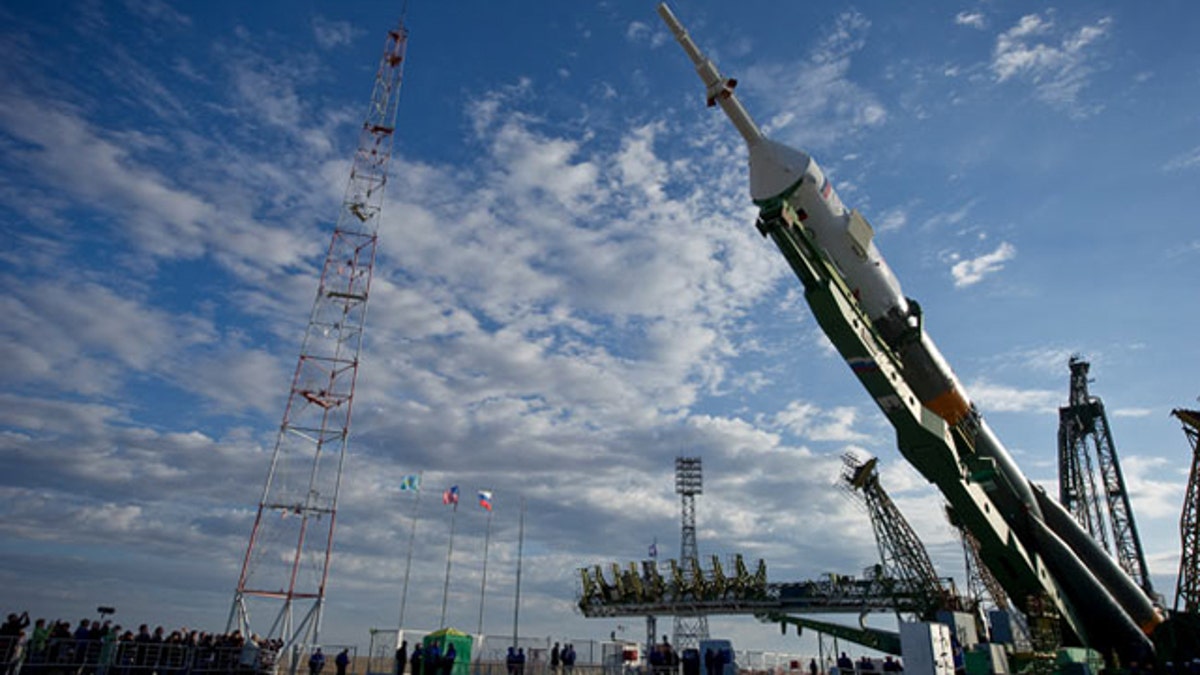
The Soyuz TMA-01M spacecraft is raised into vertical position at the launch pad of the Baikonur Cosmodrome, Kazakhstan ahead of its planned launch on Oct. 7, 2010 at 7:10 p.m. ET. (NASA/Carla Cioffi)
MOSCOW – Inspections have found that the Soyuz rockets intended to carry astronauts and cargo to the International Space Station do not have the flaw that caused an unmanned cargo ship to crash in August, Russia's space chief said Friday.
The Soyuz became the only way to reach the space station after NASA retired the space shuttle in July. Then, in August, a Soyuz crashed in a mishap blamed on an "accidental" manufacturing flaw.
Russian Space Agency head Vladimir Popovkin told lawmakers Friday that a check of 18 rocket engines from the same batch has found no faults so far. He didn't say how many engines already had been checked.
"That allows us to say that it [the manufacturing flaw in the failed rocket] was a singular occasion," he said.
Popovkin added that the space agency had to take the engines back from the Baikonur cosmodrome in Kazakhstan and Kourou launchpad in French Guiana for a thorough examination.
The next Soyuz launches have been postponed pending the outcome of the probe. Popovkin said a cargo ship will be launched on Oct. 30 and a manned mission will follow on Nov. 14.
NASA said the space station -- continuously manned for nearly 11 years -- will need to be abandoned temporarily if a new crew cannot be launched before the last of the station's six residents fly back to Earth in mid-November.
The August Soyuz crash was the latest in a string of spectacular launch failures that have raised concerns about the condition of the nation's space industries and prompted lawmakers in the lower house of parliament to summon Popovkin to give them a briefing.
Last December, Russia has lost three navigation satellites when a rocket carrying them failed to reach orbit. A military satellite was lost in February, and the launch of the Express-AM4, described by officials as Russia's most powerful telecommunications satellite, went awry in August.
Popovkin said that obsolete equipment and an aging workforce have weakened space industries. He said that the space agency will establish its own quality inspection teams at rocket factories to tighten oversight over production quality.
He said that Russia plans to increase its fleet of navigation satellites from 24 to 30 in the next few years to make its GLONASS satellite navigation system fully capable. Russia has boasted about GLONASS as an equivalent of the U.S. Global Positioning System, or GPS, but it has struggled to make the system operational due to a short life span of its satellites and launch failures.
Popovkin said that Russia will also raise the number of its communication satellites from 26 to 48 by 2015.
Popovkin said that Russia will continue to help China develop its space program, but added that his agency would be careful about transfer of technologies. He admitted that Russia and China have had "tough" arguments about the issue.
In 2003, China became the third country after the U.S. and Russia to send an astronaut into space on its own, relying on technologies it bought from Moscow. The Chinese Shenzhou spacecraft closely resembles the Russian Soyuz.
